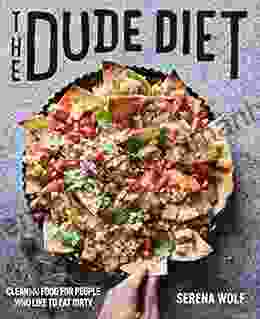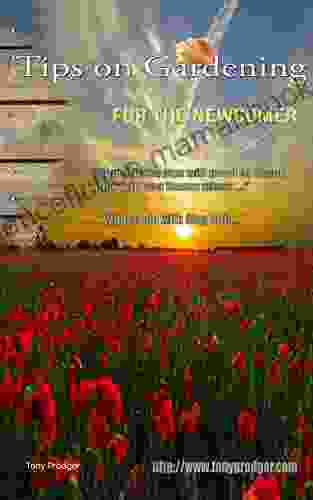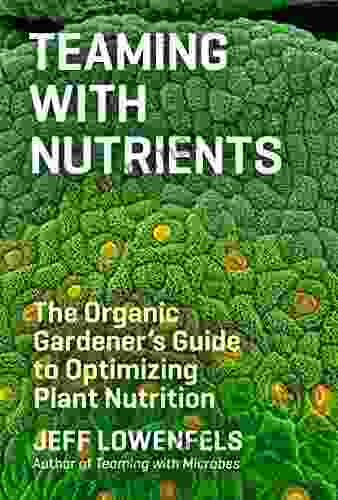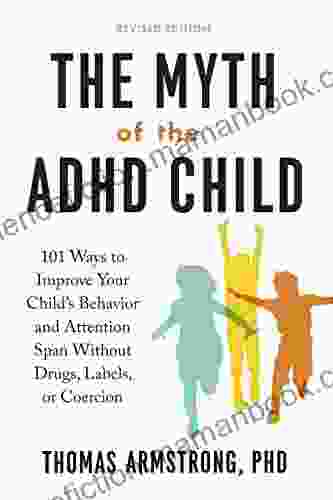The Organic Gardener's Guide to Optimizing Plant Nutrition for Enhanced Growth and Productivity

In the world of organic gardening, nurturing the health and productivity of your plants through optimal nutrition is crucial. Understanding the essential nutrients, utilizing organic fertilizers, and maintaining soil health are key pillars in achieving a thriving organic garden. This comprehensive guide will empower you with the knowledge and practical tips to optimize plant nutrition for enhanced growth and productivity.
4.8 out of 5
| Language | : | English |
| File size | : | 11687 KB |
| Text-to-Speech | : | Enabled |
| Screen Reader | : | Supported |
| Enhanced typesetting | : | Enabled |
| Word Wise | : | Enabled |
| Print length | : | 250 pages |
| Lending | : | Enabled |
Essential Nutrients for Plant Growth
Plants require a balanced supply of essential nutrients to thrive. These nutrients can be categorized into macronutrients and micronutrients, each playing specific roles in plant development and overall health.
Macronutrients
- Nitrogen (N): Essential for vegetative growth, chlorophyll production, and protein synthesis.
- Phosphorus (P): Promotes root development, flowering, and fruit production.
- Potassium (K): Regulates water balance, photosynthesis, and disease resistance.
- Calcium (Ca): Strengthens cell walls, promotes root growth, and prevents blossom-end rot.
- Magnesium (Mg): Aids in chlorophyll production, photosynthesis, and seed germination.
- Sulfur (S): Component of amino acids, proteins, and enzymes.
Micronutrients
- Iron (Fe): Essential for chlorophyll production and photosynthesis.
- Manganese (Mn): Involved in photosynthesis, nitrogen metabolism, and disease resistance.
- Zinc (Zn): Plays a role in hormone production, enzyme activation, and disease resistance.
- Copper (Cu): Essential for photosynthesis, enzyme activity, and lignin formation.
- Boron (B): Supports cell wall formation, pollination, and seed development.
- Molybdenum (Mo): Necessary for nitrogen fixation in legumes.
Organic Fertilizers: Nature's Nutrient Providers
Organic fertilizers, derived from natural sources, provide a sustainable and eco-friendly approach to plant nutrition. They not only supply essential nutrients but also enhance soil health and promote beneficial microbial activity.
Compost
Compost, a rich organic matter created by the decomposition of organic materials, is a powerhouse of nutrients. It contains a balanced blend of macronutrients, micronutrients, and beneficial microorganisms.
Manure
Animal manure, such as cow, horse, or chicken manure, is another excellent source of organic nutrients. It is important to note that fresh manure should be composted or aged before applying to gardens to prevent burning or disease transmission.
Plant-Based Fertilizers
Plant-based fertilizers, such as seaweed extract or alfalfa meal, provide specific nutrients and growth-promoting substances. They can be used as foliar sprays or incorporated into the soil.
Cover Crops
Cover crops, such as clover, vetch, or ryegrass, are planted to cover bare soil and provide numerous benefits. They add organic matter, fix nitrogen, and suppress weeds while preventing soil erosion.
Mulch
Mulch, a layer of organic material spread around plants, helps retain moisture, regulate soil temperature, suppress weeds, and gradually release nutrients into the soil.
Soil Health: The Foundation of Plant Nutrition
Healthy soil is the cornerstone of a thriving garden. It provides a stable environment for roots to grow and access nutrients while supporting beneficial microorganisms and organic matter.
Soil pH
Soil pH, a measure of acidity or alkalinity, influences nutrient availability. Most plants prefer a slightly acidic to neutral pH range (6.0 to 7.0).
Organic Matter
Organic matter, including compost and decayed plant material, improves soil structure, water retention, and nutrient availability. It also supports beneficial soil microorganisms.
Microbial Activity
Beneficial soil microorganisms, such as bacteria and fungi, play a crucial role in nutrient cycling, disease suppression, and overall plant health. They break down organic matter, release nutrients, and form symbiotic relationships with plants.
Practical Tips for Optimizing Plant Nutrition
- Conduct a soil test to determine the specific nutrient requirements of your soil.
- Choose organic fertilizers that provide a balanced blend of nutrients.
- Apply compost and manure regularly to enrich the soil and promote microbial activity.
- Plant cover crops to improve soil structure, fix nitrogen, and suppress weeds.
- Use mulch to retain moisture, regulate soil temperature, and gradually release nutrients.
- Practice crop rotation to avoid nutrient depletion and disease buildup.
- Observe your plants for signs of nutrient deficiencies or imbalances and adjust fertilization accordingly.
- Maintain soil pH within the optimal range for plant growth.
- Avoid excessive fertilization, as this can lead to nutrient imbalances and environmental problems.
- Water your plants regularly to ensure nutrient uptake and prevent nutrient leaching.
By understanding the essential nutrients, utilizing organic fertilizers, and maintaining soil health, organic gardeners can create a thriving environment for their plants. Optimizing plant nutrition is the key to unlocking enhanced growth, increased productivity, and a healthy organic garden that is resilient and sustainable.
Remember, gardening is an ongoing journey of learning and experimentation. Observe your plants, study the signs, and adjust your practices as needed. With patience, dedication, and a commitment to organic principles, you can create a bountiful and thriving garden that nourishes both your family and the planet.
4.8 out of 5
| Language | : | English |
| File size | : | 11687 KB |
| Text-to-Speech | : | Enabled |
| Screen Reader | : | Supported |
| Enhanced typesetting | : | Enabled |
| Word Wise | : | Enabled |
| Print length | : | 250 pages |
| Lending | : | Enabled |
Do you want to contribute by writing guest posts on this blog?
Please contact us and send us a resume of previous articles that you have written.
 Top Book
Top Book Novel
Novel Fiction
Fiction Nonfiction
Nonfiction Literature
Literature Paperback
Paperback Hardcover
Hardcover E-book
E-book Audiobook
Audiobook Bestseller
Bestseller Classic
Classic Mystery
Mystery Thriller
Thriller Romance
Romance Fantasy
Fantasy Science Fiction
Science Fiction Biography
Biography Memoir
Memoir Autobiography
Autobiography Poetry
Poetry Drama
Drama Historical Fiction
Historical Fiction Self-help
Self-help Young Adult
Young Adult Childrens Books
Childrens Books Graphic Novel
Graphic Novel Anthology
Anthology Series
Series Encyclopedia
Encyclopedia Reference
Reference Guidebook
Guidebook Textbook
Textbook Workbook
Workbook Journal
Journal Diary
Diary Manuscript
Manuscript Folio
Folio Pulp Fiction
Pulp Fiction Short Stories
Short Stories Fairy Tales
Fairy Tales Fables
Fables Mythology
Mythology Philosophy
Philosophy Religion
Religion Spirituality
Spirituality Essays
Essays Critique
Critique Commentary
Commentary Glossary
Glossary Bibliography
Bibliography Index
Index Table of Contents
Table of Contents Preface
Preface Introduction
Introduction Foreword
Foreword Afterword
Afterword Appendices
Appendices Annotations
Annotations Footnotes
Footnotes Epilogue
Epilogue Prologue
Prologue Zita West
Zita West Jeanette Nyberg
Jeanette Nyberg Wilborn Hampton
Wilborn Hampton Sara Orwig
Sara Orwig Hugh Brewster
Hugh Brewster L S O Dea
L S O Dea Guile O Coyote
Guile O Coyote Arthur J Stewart
Arthur J Stewart Sam J Fires
Sam J Fires A K Scott
A K Scott W E B Du Bois
W E B Du Bois Angie K Griffin
Angie K Griffin Ramona Ausubel
Ramona Ausubel John Keats
John Keats Dan Cosley
Dan Cosley Natalie Chanin
Natalie Chanin Yamen Manai
Yamen Manai Emmanuelle Snow
Emmanuelle Snow Michael Ruhlman
Michael Ruhlman Beata Borucka
Beata Borucka
Light bulbAdvertise smarter! Our strategic ad space ensures maximum exposure. Reserve your spot today!
 Caleb LongFollow ·13.6k
Caleb LongFollow ·13.6k Jim CoxFollow ·3k
Jim CoxFollow ·3k Harry HayesFollow ·13.8k
Harry HayesFollow ·13.8k Warren BellFollow ·19.8k
Warren BellFollow ·19.8k E.E. CummingsFollow ·7.3k
E.E. CummingsFollow ·7.3k Raymond ChandlerFollow ·8.5k
Raymond ChandlerFollow ·8.5k Dan BrownFollow ·14.7k
Dan BrownFollow ·14.7k Eric HayesFollow ·15.7k
Eric HayesFollow ·15.7k

 Ashton Reed
Ashton ReedClean(ish) Food for People Who Like to Eat Dirty
By: [Your Name] Are...

 Ronald Simmons
Ronald SimmonsThe Handbook for Educators: A Comprehensive Guide to...
The Handbook for...

 Derrick Hughes
Derrick HughesAny Place Hang My Hat: A Hauntingly Beautiful Novel by...
A Masterpiece of...

 Adrien Blair
Adrien BlairFly Me to the Moon Vol. 5: A Lunar Odyssey through...
In the vast...

 William Powell
William PowellTips By Gardeners On Variety Of Subjects
Gardening...
4.8 out of 5
| Language | : | English |
| File size | : | 11687 KB |
| Text-to-Speech | : | Enabled |
| Screen Reader | : | Supported |
| Enhanced typesetting | : | Enabled |
| Word Wise | : | Enabled |
| Print length | : | 250 pages |
| Lending | : | Enabled |













